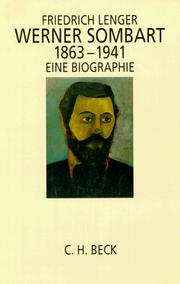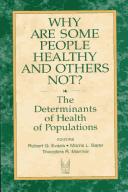| Listing 1 - 10 of 14 | << page >> |
Sort by
|
Book
ISBN: 3885205270 Year: 1994 Publisher: Berlin Elefanten Press
Abstract | Keywords | Export | Availability | Bookmark
 Loading...
Loading...Choose an application
- Reference Manager
- EndNote
- RefWorks (Direct export to RefWorks)
Sociologists --- Germany
Book
ISBN: 2234043441 9782234043442 Year: 1994 Publisher: Paris: Stock,
Abstract | Keywords | Export | Availability | Bookmark
 Loading...
Loading...Choose an application
- Reference Manager
- EndNote
- RefWorks (Direct export to RefWorks)
Tout être humain a ses démons. Ce sont des entités spirituelles qui nous sont à la fois inférieures et supérieures, auxquelles nous obéissons sans le savoir. D'où viennent-ils ? Pourquoi sont-ils si puissants en nous ? Que font-ils de nous et que faisons-nous d'eux ? Peuvent-ils se modifier, voire se transformer par l'expérience de la vie ? J'ai voulu reconnaître les démons qui ont occupé et animé mon esprit, et m'ont différencié sans que j'ai cherché à me singulariser. A chaque fois, j'ai voulu remonter à leur origine, voir comment ils se sont formés, m'ont formé, se sont transformés et m'ont transformé. A la fin de ce livre, j'essaie de reconnaître à quelles erreurs mes démons m'ont conduit, à quelles vérités je demeure fidèle et, désormais capable de dialoguer avec eux, je les assume de façon consciente. A la fois confession et credo, Mes démons est inclassable. Ce livre d'écrivain, d'historien, de penseur s'efforce de reporter sur son auteur lui-même, et sur ses expériences dans le siècle, la pensée complexe dont il a été l'initiateur. On y retrouve le regard du sociologue soucieux des événements présents, celui de l'anthropologue attentif au mythe et à l'imaginaire, et enfin l'auteur de La Méthode, pour qui la complexité est devenue le défi que doit affronter l'esprit humain.
Sociologists --- Sociologues --- Biography --- Biographies --- Morin, Edgar --- Morin, Edgar, --- Sociologists - France - Biography --- Morin, Edgar, - 1921 --- -Sociologists --- Philosophie --- Société --- Morin, Edgar, - 1921-

ISBN: 087546324X 0875463258 1501744925 Year: 1994 Publisher: Ithaca, N.Y. : ILR Press,
Abstract | Keywords | Export | Availability | Bookmark
 Loading...
Loading...Choose an application
- Reference Manager
- EndNote
- RefWorks (Direct export to RefWorks)
Sociologists --- Sociologues --- Biography --- Biographie --- Whyte, William Foote,

ISBN: 0807821411 Year: 1994 Publisher: Chapel Hill University of North Carolina Press
Abstract | Keywords | Export | Availability | Bookmark
 Loading...
Loading...Choose an application
- Reference Manager
- EndNote
- RefWorks (Direct export to RefWorks)
Vance Packard's number-one bestsellers - Hidden Persuaders (1957), Status Seekers (1959), and Waste Makers (1960) - taught the generation of Americans that came of age in the late 1950s and early 1960s about the dangers posed by advertising, social climbing, and planned obsolescence. Like Betty Friedan and William H. Whyte, Jr., Packard (1914- ) is a journalist who played an influential role as the largely complacent 1950s gave way to the tumultuous 1960s. He is also one of the first social critics to foster and to benefit from the newly energized social and political consciousness of this period. Raised on a Pennsylvania farm, shaped by the New Deal at home and the rise of fascism abroad, and trained as a journalist, Packard turned to writing nonfiction books when he faced unemployment in 1956. In addition to his three best-known early works, his later books explore many of the forces shaping America, including invasion of privacy, changing sexual mores, the uprooting of families, and the rise of the ultra rich in the Reagan era. The titles of Packard's most famous works have become a part of our everyday vocabulary. Based in part on interviews with Packard, Daniel Horowitz's intellectual biography focuses on the period during which Packard wrote his major works of social criticism. Horowitz also traces the influence of the writer's early family life and education on his thought. Packard's life illuminates the dilemmas of a freelance social critic without inherited wealth or academic affiliation: the tension between making a living and sustaining independence; the problems posed by a dramatically fluctuating royalty income; and the impact of changing relationships with audience, publishers, intellectuals, academics, and new media such as television and the New Journalism. Packard's career also expands our understanding of how one era helped create the next, underscoring how the adversarial 1960s drew on the mass culture of the previous decade.
Sociology --- Journalism --- Packard, V. --- Journalists --- Historians --- United States --- Biography --- Social conditions --- 1945 --- -Sociologists

ISBN: 0807862118 0585032599 9780585032597 9780807862117 0807821411 9780807821411 9798890866219 Year: 1994 Publisher: Chapel Hill : The University of North Carolina Press,
Abstract | Keywords | Export | Availability | Bookmark
 Loading...
Loading...Choose an application
- Reference Manager
- EndNote
- RefWorks (Direct export to RefWorks)
Vance Packard's number-one bestsellers - Hidden Persuaders (1957), Status Seekers (1959), and Waste Makers (1960) - taught the generation of Americans that came of age in the late 1950s and early 1960s about the dangers posed by advertising, social climbing, and planned obsolescence. Like Betty Friedan and William H. Whyte, Jr., Packard (1914- ) is a journalist who played an influential role as the largely complacent 1950s gave way to the tumultuous 1960s. He is also one of the first social critics to foster and to benefit from the newly energized social and political consciousness of this period. Raised on a Pennsylvania farm, shaped by the New Deal at home and the rise of fascism abroad, and trained as a journalist, Packard turned to writing nonfiction books when he faced unemployment in 1956. In addition to his three best-known early works, his later books explore many of the forces shaping America, including invasion of privacy, changing sexual mores, the uprooting of families, and the rise of the ultra rich in the Reagan era. The titles of Packard's most famous works have become a part of our everyday vocabulary. Based in part on interviews with Packard, Daniel Horowitz's intellectual biography focuses on the period during which Packard wrote his major works of social criticism. Horowitz also traces the influence of the writer's early family life and education on his thought. Packard's life illuminates the dilemmas of a freelance social critic without inherited wealth or academic affiliation: the tension between making a living and sustaining independence; the problems posed by a dramatically fluctuating royalty income; and the impact of changing relationships with audience, publishers, intellectuals, academics, and new media such as television and the New Journalism. Packard's career also expands our understanding of how one era helped create the next, underscoring how the adversarial 1960s drew on the mass culture of the previous decade.
Sociologists --- Historians --- Journalists --- Social Change --- Sociology & Social History --- Social Sciences --- Packard, Vance, --- Packard, Vance --- United States --- Social conditions
Book
ISBN: 2738427081 Year: 1994 Publisher: Paris : L'Harmattan,
Abstract | Keywords | Export | Availability | Bookmark
 Loading...
Loading...Choose an application
- Reference Manager
- EndNote
- RefWorks (Direct export to RefWorks)
Anthropologists --- Sociologists --- Labor --- Sociology --- Working class --- Anthropologues --- Sociologues --- Sociologie --- Travailleurs --- Sociological aspects --- Social conditions --- Conditions sociales --- Verret, Michel

ISBN: 0262231743 Year: 1994 Publisher: Cambridge, Mass. : MIT Press,
Abstract | Keywords | Export | Availability | Bookmark
 Loading...
Loading...Choose an application
- Reference Manager
- EndNote
- RefWorks (Direct export to RefWorks)
Critical theory --- Frankfurt school of sociology --- Marxian school of sociology --- Philosophy, German --- Sociology --- Sociologists --- Théorie critique --- Ecole de Francfort (Sociologie) --- Sociologie marxiste --- Philosophie allemande --- Sociologie --- Sociologues --- History --- Biography --- Philosophy --- Histoire --- Biographie --- Philosophie

ISBN: 3518286587 Year: 1994 Publisher: Frankfurt am Main Suhrkamp
Abstract | Keywords | Export | Availability | Bookmark
 Loading...
Loading...Choose an application
- Reference Manager
- EndNote
- RefWorks (Direct export to RefWorks)
141.822 --- Logical positivism --- Frankfurt school of sociology --- Vienna circle --- Viennese circle --- Wiener Kreis --- Philosophers --- Critical theory (Sociology) --- Frankfurt school --- Frankfurt sociologists --- Schools of sociology --- Critical theory --- Marxian school of sociology --- Logical empiricism --- Neo-empiricism --- Neo-positivism --- Physicalism --- Positivism, Logical --- Unity of science movement --- Language and logic --- Logic --- Meaning (Psychology) --- Positivism --- Reductionism --- Relationism --- Science --- Analysis (Philosophy) --- Verification (Empiricism) --- 141.822 Ontwikkeling van het marxisme. Frankfurter Schule --- Ontwikkeling van het marxisme. Frankfurter Schule --- Philosophy --- Vienna Circle. --- Vienna Circle --- Frankfurt school of sociology. --- Logical positivism.

ISBN: 3406380948 9783406620218 Year: 1994 Publisher: München Beck
Abstract | Keywords | Export | Availability | Bookmark
 Loading...
Loading...Choose an application
- Reference Manager
- EndNote
- RefWorks (Direct export to RefWorks)
#KVHA:Taalkunde Duits --- #KVHA:Cultuurgeschiedenis Duitsland --- #KVHA:Sociologie Duitsland --- #KVHA:Sombart, Werner --- Sombart, Werner --- Sombart, Werner, --- Sombart, --- Werner, --- Socialism --- Sociologists --- 08 --- 330.46 --- AA / International- internationaal --- History --- Biography --- Biografieën en memoires --- Hedendaagse periode, met inbegrip van de psychologische school (Oostenrijkse), mathematische school, solidarisme, communisme, marxisme, bolsjewisme, anarchisme --- Zombart, V., --- Zongba, --- זאמבארט, ווערנער --- זאמבארט, װערנער --- זומברט, ברנר, --- זומברט, וו --- 宗拔, --- Bibliography. --- Sociology --- Sociologues --- Sociologie --- Socialisme --- Biographie --- Histoire --- Bibliographie --- Zombart, Verner, --- Зомбарт, Вернер, --- #KVHA:Cultuurgeschiedenis; Duitsland --- #KVHA:Sociologie; Duitsland --- #KVHA:Taalkunde; Duits

ISBN: 3110145081 0202304906 Year: 1994 Publisher: Berlin de Gruyter
Abstract | Keywords | Export | Availability | Bookmark
 Loading...
Loading...Choose an application
- Reference Manager
- EndNote
- RefWorks (Direct export to RefWorks)
Environmental health. --- Medical policy. --- Public health. --- Social medicine. --- Environmental health --- Medical policy --- Public health --- Social medicine --- Environmental quality --- Health --- Health ecology --- Environmental engineering --- Health risk assessment --- Medical care --- Medical sociology --- Medicine --- Medicine, Social --- Public welfare --- Sociology --- Medical ethics --- Medical sociologists --- Community health --- Health services --- Hygiene, Public --- Hygiene, Social --- Public health services --- Public hygiene --- Sanitary affairs --- Social hygiene --- Human services --- Biosecurity --- Health literacy --- Medicine, Preventive --- National health services --- Sanitation --- Health care policy --- Health policy --- Medicine and state --- Policy, Medical --- Public health policy --- State and medicine --- Science and state --- Social policy --- Health aspects --- Environmental aspects --- Social aspects --- Government policy
| Listing 1 - 10 of 14 | << page >> |
Sort by
|

 Search
Search Feedback
Feedback About UniCat
About UniCat  Help
Help News
News